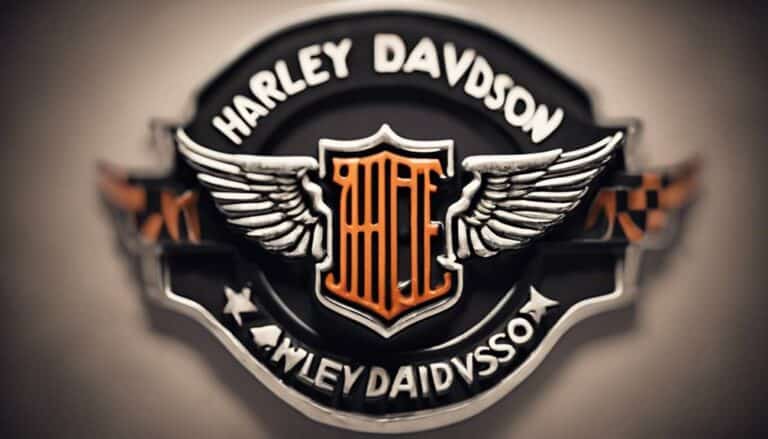So, you might be wondering, when exactly did AMF purchase Harley-Davidson? Well, let's take a closer look at this pivotal moment in the history of the iconic motorcycle company.
The acquisition by AMF marked a significant turning point for Harley-Davidson, but the story doesn't end there.
The impact of this purchase, both positive and negative, had long-lasting effects on the brand's reputation and future direction.
Stay tuned to uncover more about the timeline and implications of AMF's ownership of Harley-Davidson.
Key Takeaways
- AMF purchased Harley-Davidson in 1969, rescuing the company from financial distress.
- The AMF ownership lasted for 12 years, providing stability and resources to Harley-Davidson.
- Quality concerns arose during the AMF era, impacting customer loyalty.
- The sale of Harley-Davidson by AMF occurred in 1981, marking a new beginning for the company.
Acquisition of Harley-Davidson by AMF
During its acquisition of Harley-Davidson in 1969, AMF played a crucial role in rescuing the company from financial distress. The purchase by AMF marked a significant transition for Harley-Davidson, saving it from looming financial troubles. This acquisition was a pivotal moment in the brand's development, as AMF took ownership of Harley-Davidson for the next 12 years.
AMF's intervention came at a time when Harley-Davidson was struggling financially, injecting much-needed stability and resources into the company. The purchase by AMF not only saved Harley-Davidson from potential collapse but also provided a new direction for the brand under AMF's ownership. The 12-year period of AMF's control over Harley-Davidson saw various changes, both in terms of production processes and branding strategies, shaping the company's trajectory for years to come.
Impact on Harley-Davidson's Reputation
The acquisition of Harley-Davidson by AMF in 1969 significantly impacted the brand's reputation, leading to concerns about quality and reliability during the AMF ownership era. This period marked a significant shift for Harley-Davidson, with several repercussions:
- Lower Workmanship Standards: The AMF ownership era brought about perceived declines in workmanship standards, affecting the overall quality of Harley-Davidson motorcycles.
- Decreased Customer Loyalty: Riders encountered issues with AMF-era Harley-Davidson bikes, resulting in a decline in customer loyalty towards the brand.
- Challenges to Brand Integrity: Quality concerns during the AMF ownership period not only impacted sales but also posed challenges to Harley-Davidson's brand integrity, emphasizing the importance of maintaining high standards in the motorcycle industry.
Navigating through the aftermath of the AMF acquisition, Harley-Davidson faced a critical juncture in preserving its reputation and reaffirming its commitment to quality and reliability for the future.
Notable AMF-Era Harley-Davidson Models
Navigating through the AMF ownership era, enthusiasts and collectors alike cherish several notable Harley-Davidson models that emerged during this period. The AMF era saw the introduction of the Harley-Davidson FX 1200 Super Glide, a hybrid model that blended elements of touring and sport bikes. In 1976, the limited-edition Bicentennial Liberty celebrated America's 200th anniversary, capturing the patriotic spirit of the time. However, the Confederate Edition Series of 1977 stirred controversy due to its design choices. The XLCR model of the same year faced poor sales initially but has now become a sought-after gem for collectors interested in AMF-era Harley-Davidsons. Additionally, the XR-750 racing bike, a product of the AMF years, gained legendary status in flat track competitions, showcasing the brand's racing prowess. Below is a table summarizing these iconic models:
| Model | Year | Notable Features |
|---|---|---|
| FX 1200 Super Glide | – | Hybrid model blending touring and sport |
| Bicentennial Liberty | 1976 | Limited-edition celebrating bicentennial |
| Confederate Edition Series | 1977 | Controversial design |
| XLCR | 1977 | Initially low sales, now coveted by collectors |
| XR-750 Racing Bike | – | Legendary status in flat track competitions |
Challenges Faced During AMF Ownership
Amidst the complexities of AMF ownership, Harley-Davidson encountered numerous challenges that tested the brand's resilience and adaptability in the face of growing competition. Japanese motorcycle brands like Yamaha and Honda gained popularity, intensifying competition from various manufacturers worldwide. Concerns regarding the build quality and reliability of AMF-era Harley-Davidsons emerged, impacting consumer trust. Despite these challenges, some enthusiasts appreciated the unique characteristics of AMF-era Harley-Davidsons, adding a layer of complexity to the brand's image.
- Market demand for AMF-era parts, accessories, and advertising materials remained strong, reflecting a continued interest in this period of Harley-Davidson's history.
- The need to address issues related to build quality and reliability to compete with rising Japanese motorcycle brands became a pressing concern.
- Balancing the uniqueness of AMF-era Harley-Davidsons with meeting consumer expectations for quality and performance posed significant ownership challenges that required strategic decisions.
Sale of Harley-Davidson by AMF
After facing numerous challenges during its ownership, Harley-Davidson was sold back to its original owners by AMF in 1981, marking a pivotal moment in the company's history. The reacquisition, led by executives like William G. Davidson and Vaughn Beals, ended AMF's 12-year stint as the owner of Harley-Davidson.
This sale signified a new beginning for the company, aiming to enhance motorcycle quality and restore the brand's reputation. The decision to sell back Harley-Davidson was driven by a commitment to revitalizing the company's image and returning it to its former glory.
Conclusion
You've explored how AMF's purchase of Harley-Davidson in 1969 was a pivotal moment in the company's history. Despite challenges and criticisms, this era shaped Harley-Davidson's resilience and reputation.
Like a phoenix rising from the ashes, Harley-Davidson emerged stronger and more determined after the AMF ownership. The brand's ability to overcome adversity and adapt to changing market conditions is a testament to its enduring legacy in the motorcycle industry.

